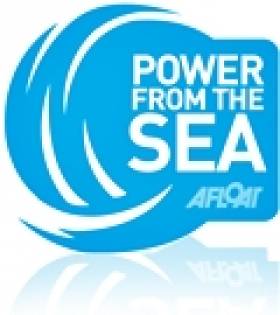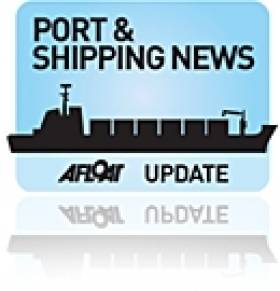Displaying items by tag: Wicklow Port Company
#POWER FROM THE SEA - This morning the wind farm turbine installation vessel Sea Energy, departed Wicklow Bay having spent over a fortnight based in Wicklow Port, where her Danish crew celebrated Christmas Day, writes Jehan Ashmore.
The Esbjerg registered vessel operated by A2 Sea, arrived in the week before Christmas to work at Airtricity's Arklow Bank Wind Farm, but the nature of the work was based on internal operations only at the seven turbine facility, which each structure scaling to a height of over 70 metres / 240 feet.
Upon completion of her work, she returned to Wicklow where her crew spent the festive season in port with a Christmas tree complete with lights! at the bow.
She remained in the harbour into the New Year and during the recent spate of heavy weather until finally departing yesterday on Little Christmas, where she overnighted in the bay.
With four towering supporting jack-up legs each 32 metres high, this enables her to carry out offshore crane operations with greater control. In addition the vessel is raised completely above the water to gain elevation to assist mounting the pre-assembled wind-turbine components from her deck cargo.
She can work in waters of up to 24 metres and as she rests on the sea-bed this provides a more stable working platform.
Sea Energy presented a distinctive profile while in port as she 'sat' close to the Packet Quay, as her jack-up legs make mooring ropes redundant.
The quay is the main commercial quay and during this week she vacated the berth to allow regular caller Scot Isles (2001/2,595grt) which arrived with a cargo of sawn packaged timber products from Scandinavia. Owned by Scot Line, the vessel remained in the port for two days and then departed for Warrenpoint.
The Wicklow Port Company also specialise in dry-cargoes, lead, and scrap-metal as previously reported, to read more click HERE.
It is somewhat unusual for vessel movements in Wicklow to berth outside the harbour piers, as in the case with Sea Energy.
She shifted berths to the seaward side of the West Pier and again she sat with jack-legs lowered in water depths of six metres, leaving a clearance of around two metres below the keel.
Although Arklow is closer to the wind-farm than Wicklow, Sea Energy's 3,332 gross tonnes is too large to be accommodated as the port on the River Avoca has a has lower water depth.
Cargoship Gets into Scrap in Wicklow
The cargoship Arklow Rebel (2,999 gross tonnes) which loaded scrap metal in Wicklow Port today, is believed to be the largest Arklow Shipping Ltd vessel to dock in the east coast port, writes Jehan Ashmore.
The 7-year old Dutch-built vessel arrived in ballast from Warrenpoint Co. Down around 01.30hrs to berth alongside the town's south quays at the Packet Quay.
Throughout this afternoon there was a steady stream of lorries laden with the scrap-metal which was loaded into the ship's hull by a quayside grabber. Upon completion of loading, the distinctive green hulled Arklow Rebel departed this evening bound for Liverpool.
She is one of nine 'R'class series of ships built by the Dutch shipyard of Barkmeijer Stroobos B.V. and has the following dimensions (90m length X 12m breath X 4m draft). For further vessel characteristics click HERE.
The Irish-flagged vessel is registered at the neighbouring port of Arklow to the south and is part of a fleet of over 40 ships managed by the Tyrrell family.
During the boom years Wicklow port was particularly busy with Scandinavian imports of bundled packaged timber and plasterboard for the construction industry.
The tidal port at the mouth of the River Leitrim also specialises in paper, lead, steel and dry bulk cargoes, principally coal in addition to other general and heavy-lift project cargoes.
For many years the issue of road traffic congestion was finally solved when the Wicklow Port Access and Town Relief Road Scheme was completed in April of last year.
The port access road (1.6km) runs between the Rathnew Road to The Murrough via a bridge that crosses the Broadlough Estuary and over the Dublin-Rosslare railway line.
- Wicklow
- Arklow Shipping Ltd
- Wicklow harbour
- Liverpool
- ASL
- Wicklow Port
- Port of Wicklow
- Wicklow Port Access and Town Relief Scheme
- Arklow Rebel
- Tyrrell
- ScrapMetal
- Port and Shipping News
- Packet Quay Wicklow
- Wicklow Port Company
- Broadlough Estuary
- River Leitrim
- The Murrough
- DublinRosslare railway line
- Barkmeijer Stoobos B.V.

























































